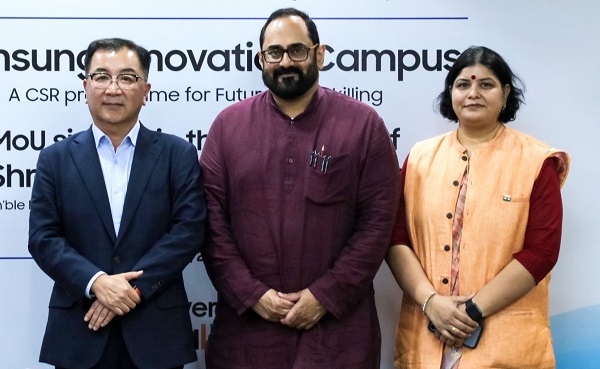New Delhi, (Asian independent) As India progresses on the path to skill millions of youth for emerging technologies, Minister of State for Electronics and IT, Rajeev Chandrasekhar, on Thursday said that digital opportunities should be equitably available to each and every Indian, especially the youth from smaller cities and towns.
Speaking after the signing of a memorandum of understanding (MoU) between Samsung and the Electronics Sector Skills Council of India (ESSCI) to train the first batch of 3,000 less-privileged students across the country, he said efforts should be taken up not just with premier educational institutions but also with universities and institutes in the tier 2 and 3 cities.
“The more employment-oriented skill is, the more aspirational it will be for the students and young Indians,” said Chandrasekhar.
Samsung launched an innovation campus in India to upskill youth in future tech domains such as AI, IoT, big data and coding/programming.
Welcoming Samsung’s initiative with the ESSCI to empower young Indians with skills, the minister said that it was a true hallmark of being a good partner to India and the Indians.
He urged Samsung to headquarter their programmes in tier 2 and Tier 3 cities to ensure skilling opportunities for the hundreds of thousands of students from those areas.
Ken Kang, President and CEO, Samsung Southwest Asia, said that Samsung has been in India for over 26 years now and is a committed partner in its growth story.
“We are aligned to the government’s vision, and through Samsung Innovation Campus, want to empower the youth and create opportunities in future tech domains, giving a further boost to new India’s growth story,” Kang added.
Samsung Innovation Campus aims to upskill youth aged 18-25 years in future technologies and enhance their employability.
“The ‘Future Tech’ programme under Samsung Innovation Campus will support in strengthening the skills ecosystem and will be an important step forward to make India a Skills capital of the world,” said Dr Abhilasha Gaur, Chief Operating Officer (Officiating CEO), ESSCI.
During the course of the programme, participants will receive instructor-led blended classroom and online training through approved training and education partners of ESSCI across the country.
They will also be imparted soft skills training to enhance their employability and provided job placements in relevant organisations, said Samsung.
Those opting for the AI course will undergo 270 hours of theory training and complete 80 hours of project work while those doing the IoT or the Big Data course will undergo 160 hours of training and complete 80 hours of project work.
Participants opting for the coding and programming course will do 80 hours of training and be part of a four-day Hackathon, the company added.








